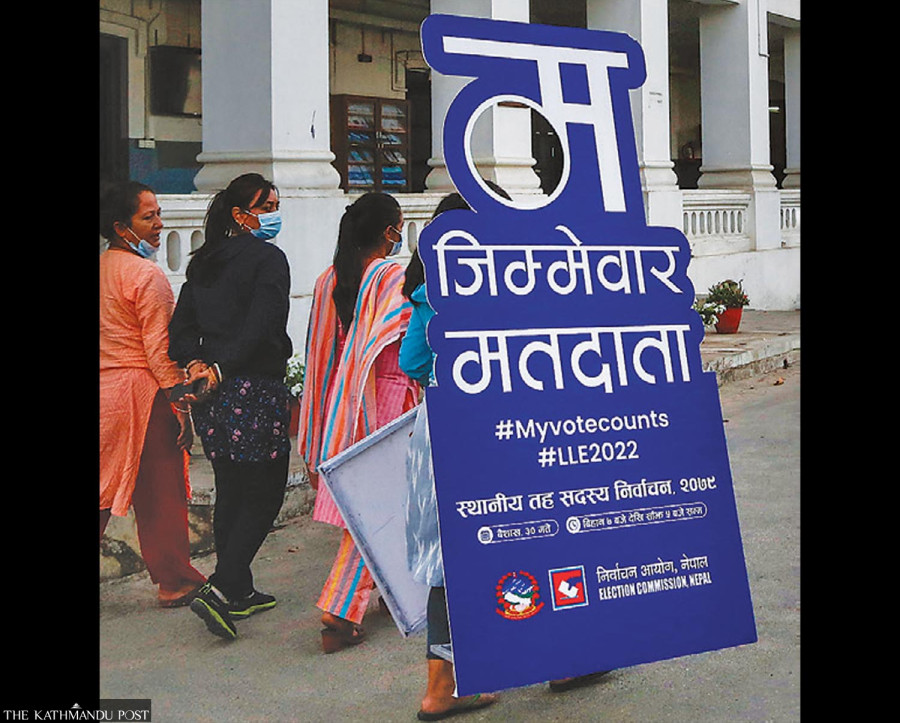National
As political parties focus on winning seats, electorate takes a back seat
Polling day is only 26 days away, but none of the parties except for Rastriya Janamorcha has unveiled their manifesto for the local level election.
Binod Ghimire
Sarala Nepal is a retired government officer with deep interest in domestic politics. As local elections are nearing, Nepal, 64, is following political parties closely and is keen on learning about their agendas.
She, however, is annoyed at parties and politicians, as none of them is talking about why they are fighting elections and how they are going to address the people’s concerns but rather have been constantly busy trying to figure out how to win the elections.
“Where are their election manifestos? The only focus of the parties is forming poll alliances,” Nepal from Suryabinayak Municipality-2 in Bhaktapur told the Post. “The parties must not forget that elections must be fought on agendas and they need to convince people why they should vote for them.”
There are just seven days left for filing nominations, with local elections slated for May 13, but five parties in the ruling coalition—Nepali Congress, CPN (Maoist Centre), CPN (Unified Socialist), Janata Samajbadi Party and Rastriya Janamorcha—have been haggling over how to share seats among themselves for 753 local units.
It’s not that election fever hasn’t gripped the parties. However, the parties are busy either distributing party memberships or negotiating seats sharing. Even after a series of meetings for weeks, they have not been able to reach a deal on an electoral alliance, with some local leaders of the coalition partners raising their voices against contesting polls jointly.
The Constitution of Nepal provides 22 explicit authorities to local governments which are directly linked to the day-to-day lives of the general public.
From school education, basic health services, local roads, irrigation facilities to the distribution of land and houses to squatters, local governments have a plethora of services to offer at people’s doorsteps
But people like Nepal say parties’ constant squabble over seats vastly undermines the electorates on whom their future solely depends.
“The local governments have so many ways to connect to the people,” said Nepal. “However, it seems the parties’ only focus is attaining power with no regard for the people. People should not be treated just as votes; there is a responsibility on parties towards the public.”
As many as 79 parties have registered themselves for local elections. Only 26 days are left for the elections, but none of them except for Rastriya Janamorcha have unveiled their election manifestos.
An election manifesto is considered a key document in which parties lay down their plans and visions for the next five years and based on their commitments, people choose which party to vote for.
Nepal is holding local elections for a second time after the promulgation of the constitution in 2015. The last local elections in 2017 were held in a gap of 20 years.
People usually invest more time and energy on choosing local representatives because those elected are the ones with whom they can directly deal with. In parliamentary and provincial elections, people elect representatives to make laws but it’s local representatives who are responsible to address people’s day-to-day concerns. That’s why, experts say, local elections hold significance.
While the coalition partners are wholly invested in forming an alliance to secure wins for themselves, the main opposition CPN-UML, which emerged as the largest party from last elections, is focusing on “exposing” the government and making strategies on ways to take advantage of the confusion in the coalition. The UML has said it will unveil its manifesto only Friday.
The basic idea of electing local governments, parties said back in 2017, was to take “Singha Durbar to the people’s doorsteps”. Singha Durbar, the seat of the government, symbolised the centralisation of power in Nepal.
But Nepali parties’ penchant for centralising power has continued in the last five years, with extreme reluctance to devolve power to local governments. Top leaderships of the parties across the spectrum have been trying to impose their decisions on candidate selection, thereby robbing their lower committees of their right to take decisions.
“Except blaming each other, I have not seen any party or politician talking about why people should vote for them for the next five years,” said Pabitra Katuwal from Sanghachowk in Sindhupalchok who currently lives in Kathmandu. “We will vote for the candidates of those parties who can convince us with their manifestos. However, no party has reached out to us yet.”
She said people seem to be excited about the upcoming elections and there is quite some media coverage, but parties have not showed up yet at people’s doorsteps.
Experts and observers say Nepal's parties do not seem to be in a hurry to unveil their manifestos, because they treat releasing such documents as a mere ritual. In democracies, parties attach great importance to their election manifestos because depending upon them, they plan to win elections for the next term. But in Nepal, according to experts, parties appear to be complacent that they can easily take the voters for a ride.
Meena Vaidya Malla, a professor and former chief of Political Science Department at the Tribhuvan University, says it’s high time parties started realising how different levels of election should be fought.
Since local needs are different across the country, for the upcoming polls, parties need to come up with commitment papers accordingly instead of distributing a broad manifesto, according to her.
“Conscious voters cast their votes after evaluating the election agendas, the strategies to implement them and the candidates the parties pick,” said Malla. “One size fits all strategy doesn’t work at the local level. There must be separate manifestos for each of them.”




 18.12°C Kathmandu
18.12°C Kathmandu














